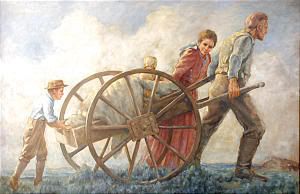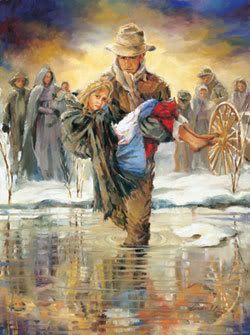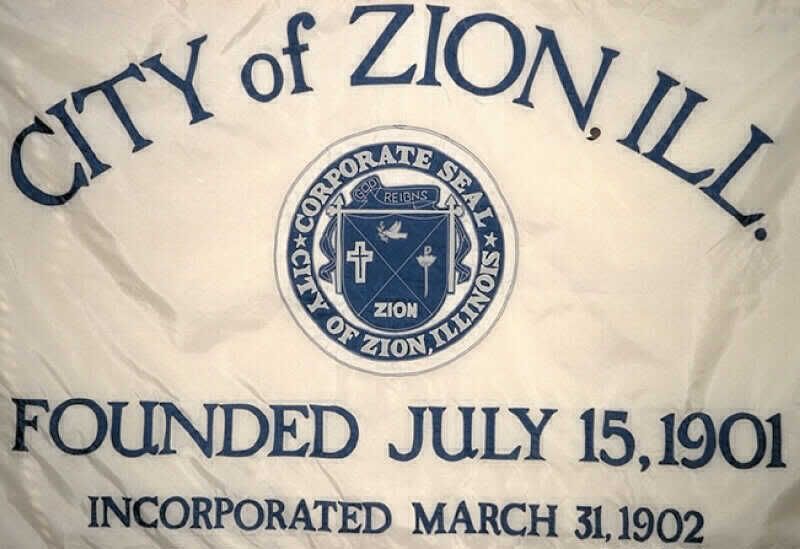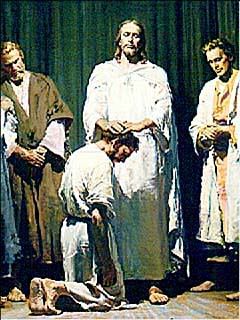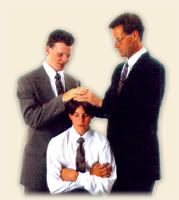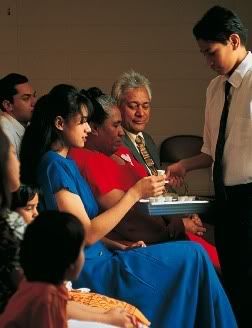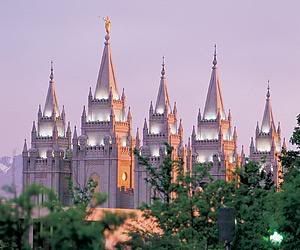The Principle of Service
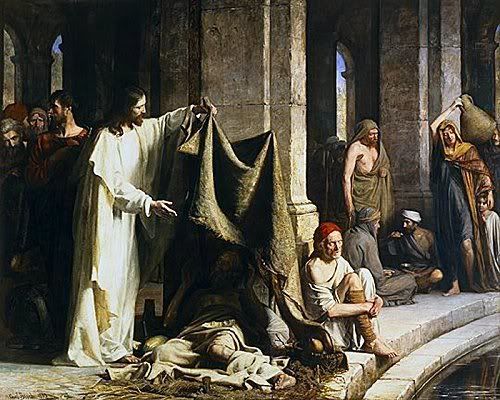 Today in Gospel Essentials (Sunday School) our class discussed the principle of service.
Today in Gospel Essentials (Sunday School) our class discussed the principle of service.
John 17: 2-3 And this is life eternal, that they might know thee the only true God, and Jesus Christ, whom thou hast sent.
The greatest gift of God and the highest hope of mankind is the promise of immortality, salvation, exaltation and eternal life. John in the New Testament defines Eternal Life as coming to know God and Jesus Christ. But how can a man "know" God? Is he "unknowable?"
John 14: 6-9 Jesus saith unto him, I am the way, the truth, and the life: no man cometh unto the Father, but by me. If ye had known me, ye should have known my Father also: and from henceforth ye know him, and have seen him. Philip saith unto him, Lord, shew us the Father, and it sufficeth us. Jesus saith unto him, Have I been so long time with you, and yet hast thou not known me, Philip? he that hath seen me hath seen the Father;
Jesus Christ was sent to Earth to reveal unto man the nature of God. If we come to know Christ then we will know the Father and inherit eternal life. But how do we come to know Christ?
Mosiah 5: 13 For how knoweth a man the master whom he has not served, and who is a stranger unto him, and is far from the thoughts and intents of his heart?
King Benjamin taught the Nephites that we can know Christ through serving him. But Christ has gained eternal life himself and has inherited all the father hath. So, what do you give someone who has everything. Well, there is one thing in this universe which God organized which was co-existent with God, which God does not own, and which God prizes more than anything. What God prizes more than anything else is the souls of men.
D&C 18: 10 Remember the worth of souls is great in the sight of God;
So great is the worth of souls to God that by serving our fellow man we are serving God. Jesus Christ in the New Testament and King Benjamin in the Book of Mormon taught that we can best serve God by serving others.
Matt. 25: 33-45 And he shall set the sheep on his right hand, but the goats on the left. Then shall the King say unto them on his aright hand, Come, ye blessed of my Father, inherit the kingdom prepared for you from the foundation of the world: For I was an hungred, and ye gave me meat: I was thirsty, and ye gave me drink: I was a stranger, and ye took me in: Naked, and ye clothed me: I was sick, and ye visited me: I was in prison, and ye came unto me. Then shall the righteous answer him, saying, Lord, when saw we thee an hungred, and fed thee? or thirsty, and gave thee drink? When saw we thee a stranger, and took thee in? or naked, and clothed thee? Or when saw we thee sick, or in prison, and came unto thee? And the King shall answer and say unto them, Verily I say unto you, Inasmuch as ye have done it unto one of the least of these my brethren, ye have done it unto me.
Mosiah 2: 12-19 I say unto you that as I have been suffered to spend my days in your service. . . And even I, myself, have labored with mine own hands that I might serve you. . . And behold, I tell you these things that ye may learn wisdom; that ye may learn that when ye are in the service of your fellow beings ye are only in the service of your God. Behold, ye have called me your king; and if I, whom ye call your king, do labor to serve you, then ought not ye to labor to serve one another? And behold also, if I, whom ye call your king, who has spent his days in your service, and yet has been in the service of God, do merit any thanks from you, O how you ought to thank your heavenly King!
To the true christian disciple, Christ is the great Examplar. Christ was sent to not only tell what God is like, but also show us what God is like. Christ showed us how to become "fishers of men" and how to serve our fellow man. Christ then commanded his disciples to do those things we have seen him do just has Christ had done those things he had seen the Father do.
3 Ne. 27: 21, 27 Verily, verily, I say unto you, this is my gospel; and ye know the things that ye must do in my church; for the works which ye have seen me do that shall ye also do; for that which ye have seen me do even that shall ye do;. . . And know ye that ye shall be judges of this people, according to the judgment which I shall give unto you, which shall be just. Therefore, what manner of men ought ye to be? Verily I say unto you, even as I am.
Christ taught that all men are created equal. He was criticized for associating with sinners and women. Christ showed by example that God is no respecter of persons because everyone is created a spirit son or daughter of God.
Mark 2: 16-17 And when the scribes and Pharisees saw him eat with publicans and sinners, they said unto his disciples, How is it that he eateth and drinketh with publicans and sinners? When Jesus heard it, he saith unto them, They that are whole have no need of the physician, but they that are sick: I came not to call the righteous, but sinners to repentance.
Christ also taught that we should do good in secret. We shouldn't serve others for the recognition of the deed. The best service is done anonymously. Also, the scriptures teach that we are not expected to do more than we are able. Christ taught Joseph Smith that "unto whom much is given, much is expected." But if we cannot give because of our circumstance, King Benjamin taught that we should have the attitude, "but if I had, I would give." Christ taught Joseph Smith that we should all be "anxiously engaged" in doing good and not wait to feel specifically inspired. We should be looking to do good always and as we initiate goodness of our own free agency, the inspiration and blessings of heaven will follow to help us.
Matt 6: 1-4 Take heed that ye do not your alms before men, to be seen of them: otherwise ye have no reward of your Father which is in heaven. Therefore when thou doest thine alms, do not sound a trumpet before thee, as the hypocrites do in the synagogues and in the streets, that they may have glory of men. Verily I say unto you, They have their reward. But when thou doest alms, let not thy left hand know what thy right hand doeth: That thine alms may be in secret: and thy Father which seeth in secret himself shall reward thee openly.
D&C 82: 3 For of him unto whom much is given much is required; and he who sins against the greater light shall receive the greater condemnation.
Mosiah 4: 24 And again, I say unto the poor, ye who have not and yet have sufficient, that ye remain from day to day; I mean all you who deny the beggar, because ye have not; I would that ye say in your hearts that: I give not because I have not, but if I had I would give.
Mosiah 4: 27 And see that all these things are done in wisdom and order; for it is not requisite that a man should run faster than he has strength. And again, it is expedient that he should be diligent, that thereby he might win the prize; therefore, all things must be done in order.
D&C 58: 27 Verily I say, men should be anxiously engaged in a good cause, and do many things of their own free will, and bring to pass much righteousness;
Christ also taught that we should allow others to serve us. On two occasions, a woman annoints Christ's feet and later his head and body. In the first instance, a pharisee objects because the woman was a sinner. In the second, the disciples object because of the expensiveness of the ointment. Christ rebukes these critics and blesses the women for their deeds. In the same way we should allow others to serve us so that God can bless them through their service.
Matt 26: 6-11 Now when Jesus was in Bethany, in the house of Simon the leper, There came unto him a woman having an alabaster box of very precious aointment, and poured it on his head, as he sat at meat. But when his disciples saw it, they had indignation, saying, To what purpose is this waste? For this ointment might have been sold for much, and given to the poor. When Jesus understood it, he said unto them, Why trouble ye the woman? for she hath awrought a good work upon me. For ye have the poor always with you; but me ye have not always.
By going through the motions of proper service and involving Christ through prayer, the scriptures promise that we will be filled with charity which is the pure love of Christ. Then, at our death or the second comming of Christ when we stand before him to be judged of our deeds, Christ promises us that we will "love his appearing" because we will "be like him." And we can look forward to the words "Well done, thou good and faithful servant: thou hast been faithful over a few things, I will make thee ruler over many things: enter thou into the joy of thy lord" (Matt. 25: 21).
Moro. 7: 48 Wherefore, my beloved brethren, pray unto the Father with all the energy of heart, that ye may be filled with this love, which he hath bestowed upon all who are true followers of his Son, Jesus Christ; that ye may become the sons of God; that when he shall appear we shall cbe like him, for we shall see him as he is; that we may have this hope; that we may be purified even as he is pure. Amen.
